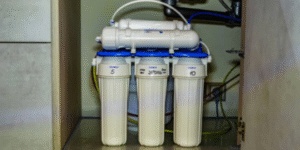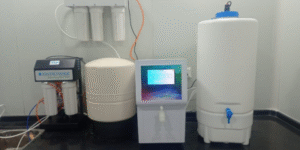You turn on the tap, fill a glass, and take a sip. The water’s clear. Cold. Doesn’t taste too bad. So, all good, right?
Well, not exactly.
In towns like Brighton, MI—and, honestly, across much of the U.S.—there’s something invisible making its way into more conversations (and more homes): PFAS. You’ve probably heard the term. Maybe you’ve seen headlines about “forever chemicals” showing up in public water systems. It sounds like something out of a dystopian novel, but it’s very much a real-world issue.
And if you’re wondering whether it’s something to worry about… well, yes. But also—don’t panic. Just get informed.
Let’s break it down.
What Are PFAS and Why Should I Care?
PFAS stands for per- and polyfluoroalkyl substances—a class of man-made chemicals that have been used in everything from nonstick cookware to firefighting foam. They’re nicknamed “forever chemicals” because they don’t break down naturally. Once they’re in the environment—or your body—they tend to stick around.
One specific type, PFOS, has been studied extensively and is linked to various health concerns including liver damage, thyroid disease, and certain cancers. Unfortunately, PFOS contamination isn’t rare, especially near industrial sites or areas where military or firefighting operations once occurred.
That’s where PFOS removal becomes a crucial topic. Removing these stubborn chemicals isn’t as easy as popping a Brita in the fridge. It takes real filtration power—more on that in a second.
Brighton’s Water: The Quiet Reality
Brighton may be a charming community with leafy neighborhoods and small-town feel, but it’s not immune to what’s happening underground. Water reports in the region have shown detectable levels of PFAS compounds—not always above the EPA’s advisory limits, but enough to make residents pause and think.
And that’s the thing. It’s not just about what’s legal. It’s about what’s safe for your family. Drinking water that contains even low levels of PFAS over time can accumulate in your system. That’s not a risk most parents, pet owners, or health-conscious folks are willing to take.
This is why homeowners are increasingly installing Brighton MI PFAS filter systems—dedicated setups designed to catch and reduce these compounds before they reach your glass.
Not All Filters Are Created Equal
Let’s talk tech for a minute. When it comes to removing PFAS, standard water filters just don’t cut it. Activated carbon filters, when designed properly, can help—but they need to be changed out regularly to stay effective. Some systems use ion exchange resins or advanced reverse osmosis to get the job done.
If this sounds like a lot of science, that’s because it is. But thankfully, you don’t have to understand the chemistry to take action. What you do need is a system that’s been tested and proven to reduce PFAS levels reliably—and one that fits your home and your lifestyle.
The bottom line: not all filtration is equal. If PFAS is your concern, make sure you’re investing in a system specifically tested for that purpose. Generic filters won’t do.
Going Beyond Just Drinking Water
Here’s something people often overlook—PFAS isn’t just a drinking water issue. If you’re bathing in it, cooking with it, or washing your veggies in it, you’re still being exposed. That’s where water purification on a whole-house level starts to make a lot of sense.
Sure, a point-of-use system under your kitchen sink might take care of your drinking water. But what about the water you bathe your kids in? Or the water that gets absorbed through your skin every time you take a hot shower?
It might sound excessive, but think about how much water you actually come into contact with each day. It adds up. Whole-house purification might not be the default option for every home, but it’s definitely worth considering if you’re aiming for a long-term, low-exposure lifestyle.
So… What Now?
If you’re still reading, you’re clearly thinking this through. And that’s the first step. You’re not alone—more and more Brighton residents are researching PFAS, testing their water, and making changes.
Here’s what to do next:
- Test Your Water. Don’t rely on assumptions. Get a lab-certified PFAS test for your home’s water supply.
- Consult a Professional. Local water treatment experts can guide you toward filter systems that work for your specific situation.
- Stay Informed. PFAS regulations and recommendations are changing. Stay in the loop on what’s safe and what’s not.
Final Thoughts: Small Changes, Big Impact
The truth is, water should be simple. Safe. Something you don’t have to second-guess. But when that trust is shaken, knowledge becomes power. Installing the right filtration system isn’t just about protecting your health—it’s about peace of mind.
Whether you’re eyeing a Brighton MI PFAS filter, digging into PFOS removal, or thinking seriously about full water purification, the goal is the same: safer water, healthier living, and a little more confidence with every sip.
Clean water isn’t a luxury. It’s a right. Let’s treat it like one.





